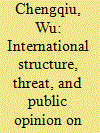|
|
|
Sort Order |
|
|
|
Items / Page
|
|
|
|
|
|
|
| Srl | Item |
| 1 |
ID:
175839


|
|
|
|
|
| Summary/Abstract |
Bilateral relations between China and the United States have evolved over the past two decades from the ‘same bed, different dreams’ of the 1990s when, despite different interests and perceptions, globalisation and multilateralism drew them closer, to the potential ‘different beds, same nightmare’ scenario where their economies draw further apart and their governments are locked in hegemonic rivalry. Drawing on Wendtian constructivism and cognitive psychology, this article proposes a systematic and dynamic theoretical framework and a review of the evolution of Sino–US relations to explain how and why the above changes happened. We subdivide Sino–US relations since the early 1990s into five periods that describe the United States’ China strategy in four aspects and China’s US strategy in three aspects. Our findings are that the United States’ China strategy has changed dramatically while China’s US strategy has remained relatively stable, and that Sino–US relations from the early 1990s to mid-2010 were characterised by cooperation borne of strategic compatibility, whereas those ensuing were characterised by competition due to strategic incompatibility. We argue that rivalry between the two countries stems from their fundamentally different ideas, namely, Chinese statist nationalism and American liberal hegemony, and that gaps in perception have exacerbated the differences. Simply put, their ‘different dreams’ have led to the ‘same nightmare’.
|
|
|
|
|
|
|
|
|
|
|
|
|
|
|
|
| 2 |
ID:
107288


|
|
|
|
|
| Publication |
2011.
|
| Summary/Abstract |
In the first decade of the 21st century, United States foreign policy developed a dramatic trajectory, undergoing a unilateralist turn under President George W. Bush and a multilateralist turn under President Barack Obama.1 Under the Bush administration, the United States not only withdrew from or undermined such multilateral international treaties as the Kyoto Protocol, the Rome Statute establishing the International Criminal Court, the Biological Weapons Convention, and the Chemical Weapons Convention, but also disregarded collective security mechanisms and multilateral international organizations to pursue its own security agenda by invading Iraq in 2003 without explicit authorization from the United Nations. In contrast, under the Obama administration, the United States on the one hand restored its relations with European allies, Russia, Latin American countries, and the Islamic World, and on the other promoted soft diplomacy with regards to various global issues, including the recent financial crisis, climate change, and nuclear proliferation. The contrast is even more telling when we juxtapose the two presidents' National Security Strategy documents. The Bush administration adopted in September 2002 a new national strategy allowing for pre-emptive strikes, whereas the Obama administration's National Security Strategy released in May 2010 emphasized building US economic strength at home and shaping the international order through engagement with other countries in order to strengthen international institutions and galvanize collective action.2 According to Obama's document, while 'the United States must reserve the right to act unilaterally if necessary', it 'will draw on diplomacy, development, and international norms and institutions to help resolve disagreements, prevent conflict, and maintain peace, mitigating where possible the need for the use of force.'3
What were the causes of Bush's turn to a unilateralist foreign policy approach and Obama's turn to a multilateralist one? To my knowledge, no study explains the two foreign policy changes under
|
|
|
|
|
|
|
|
|
|
|
|
|
|
|
|
|
|
|
|
|